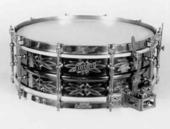William F. Ludwig, Senior, born 1879 in Germany, emigrated to the United States with his family at the age of eight. Jobs in Chicago for his father, a professional valve trombone player, were scarce. Young Ludwig, upon seeing in parade the proud drummers of the First Regiment of the Illinois National Guard, was convinced he wanted to become one of them. However, his father insisted that the drums were not a serious musical instrument. After several unproductive years of lessons on the violin and the piano, his father relented in purchasing a second-hand drum. Progress on the drums led to dates with small amateur groups and eventual paying jobs.
The seeds for the Ludwig Drum Company were planted during a 1908 vaudeville job at the Auditorium Theater in Chicago.
Ludwigs clumsy old wood pedal, accustomed to circus marches, could not meet the rigorous demands of the new syncopated jazz and ragtime rhythms. Visits to local music stores did not yield a satisfactory pedal. As a last result Ludwig built his own wooden foot pedal, capable of faster tempos without any loss of force or volume. Samples built for Ludwig by a local cabinet maker became the envy of local drummers. Robert C. Danly, Ludwigs brother-in-law in charge of the tool room at International Harvester Company, believed that the pedal could be mass produced from more durable metal materials. William and his brother Theo formed Ludwig & Ludwig in 1910, with the unique pedal being made in a rented barn on the northwest side of Chicago.
In 1909-1910 William accepted the timpani position with the Pittsburgh Symphony Orchestra. The exorbitant price of $2,800 for a pair of foreign timpani prompted Ludwig to consult with Danly on a less-expensive, higher-quality design. After three years of experimentation the first set of hydraulic action timpani were sold to the St. Paul Symphony Orchestra. After two months of use the rubber expansion tube inside the kettle burst during a performance and the fluid drained into the stage footlights.After several more experiments the two settled on a spring mechanism in 1916--the basis for the current Balanced Action Pedal Timpani.
The Ludwig & Ludwig Drum Company grew, acquiring new machinery (such as the first automatic stick turning lathe) and moving several times. The advent of moving pictures and silent films created a new need for sound effects instruments and trap drum sets.
The drum business suffered during the Great Depression. The C.G. Conn Company (located in Elkhart, Indiana) had already purchased the Leedy Manufacturing Company (another drum company located in Indianapolis). Saving Ludwig drums resulted in a merger with Conn. William was asked to manage both divisions and moved his family to Elkhart. Eventually his office was transferred back to Chicago. William, missing the opportunity to work with the actual design and manufacture of percussion instruments which Conn retained in Elkhart, tendered his resignation in 1936 to strike out on his own.
From a purchased building at 1728 North Damen Avenue in Chicago and some of his original workers the new W.F.L. Drum Company was organized in 1937. Their first product was the famous Speed King Pedal. His son Bill, Junior and daughter Betty joined the business. In 1955 William successfully bid for the Ludwig portion of the Ludwig-Leedy division still owned by Conn. With his old machinery, tooling, designs, and name back, the company was changed to Ludwig Drum Company.
The British rock and roll invasion of the 1960s brought massive growth to the drum industry. Ringo Starr of the Beatles used Ludwig drums, an opportunity William seized.
The purchase of the Musser Marimba Company, manufacturers of vibes, marimbas, bells, chimes and xylophones, transpired in 1966. Ludwig had now become a total percussion company.
In 1973 William F. Ludwig, Sr. died, to be succeeded by his son William F. Ludwig, Jr. Ludwig Industries was acquired by The Selmer Company in 1981 to create a synergy in school music markets. Today, Ludwig drums and timpani are manufactured in Monroe, North Carolina, with timpani and mallet instruments produced in LaGrange, Illinois.
